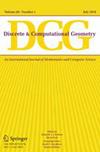正交分解成几个矩形
IF 0.6
3区 数学
Q4 COMPUTER SCIENCE, THEORY & METHODS
引用次数: 0
摘要
我们描述了一种多项式时间算法,该算法将一个边与轴平行但顶点坐标不合理的多边形作为输入,并输出一组尽可能少的矩形,通过轴平行切割和平移可以将其分割成尽可能多的矩形。矩形的数量就是多边形的 Dehn 不变量的秩。同样的方法也可用于将轴平行多边形切割成边数尽可能少的简单多边形。在允许旋转或反射的情况下,我们可以将矩形的最小数目近似到 2 倍以内。本文章由计算机程序翻译,如有差异,请以英文原文为准。

Orthogonal Dissection into Few Rectangles
We describe a polynomial time algorithm that takes as input a polygon with axis-parallel sides but irrational vertex coordinates, and outputs a set of as few rectangles as possible into which it can be dissected by axis-parallel cuts and translations. The number of rectangles is the rank of the Dehn invariant of the polygon. The same method can also be used to dissect an axis-parallel polygon into a simple polygon with the minimum possible number of edges. When rotations or reflections are allowed, we can approximate the minimum number of rectangles to within a factor of two.
求助全文
通过发布文献求助,成功后即可免费获取论文全文。
去求助
来源期刊

Discrete & Computational Geometry
数学-计算机:理论方法
CiteScore
1.80
自引率
12.50%
发文量
99
审稿时长
6-12 weeks
期刊介绍:
Discrete & Computational Geometry (DCG) is an international journal of mathematics and computer science, covering a broad range of topics in which geometry plays a fundamental role. It publishes papers on such topics as configurations and arrangements, spatial subdivision, packing, covering, and tiling, geometric complexity, polytopes, point location, geometric probability, geometric range searching, combinatorial and computational topology, probabilistic techniques in computational geometry, geometric graphs, geometry of numbers, and motion planning.
 求助内容:
求助内容: 应助结果提醒方式:
应助结果提醒方式:


